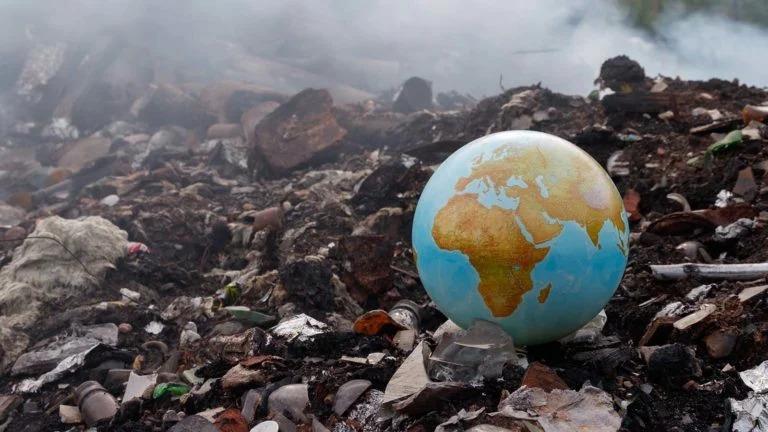Cost of climate change to Pakistani economy is massive


Taimoor Abbas Dogar
Global warming is an issue that has consequences affecting the entire world, especially developing nations such as Pakistan. Among the ten countries most vulnerable to climate change and natural disasters and their adverse impacts, Pakistan has a long list of relevant challenges that affect its social, environmental, and economic progress.
It has been observed from the records that the past one hundred years statistics of Pakistan now signifies an increase in annual mean temperatures and sea levels. Annually, the mean temperature of the country has risen by about 0.63 C while the sea level on the coastal belt of Karachi has been increasing by 1.1mm per year. continued since 2006, and then the rate of increase has doubled and reached 3.6±0.5mm/yr in 2015.
These changes are accompanied by a quite diverse and somewhat increasing precipitation pattern since the year 1960 indicating significant sub-national differences. For example, mean rainfall has reduced by between 10%-15% in the arid plains and the coastal belt thus negating wetlands and Mangroves which are important ecosystems. On the other hand, heavy rainfall events and heatwave days have risen, which alters the frequency and intensity of extreme climate events.
The cost of climate change to the Pakistani economy is massive. Between the years 1992 and 2021, climate- and weather-related disasters caused a value of US$ 29.3 billion, or 11.1 per cent of the 2020 GDP. But the drought period of 1998-2002 and later in 2014- 2015 has affected the southern part of the country more critically and the heat wave during the year 2015 when over 65000 people were hospitalized due to heat stroke and the floods in the year 2010 and 2022 have been devastating.
Thus, the floods of 2022 affected 33 million people, leaving 7,9 million people without shelter; infrastructure, agriculture, and livestock were severely damaged. In Pakistan, the agriculture industry is one of the most significant industries, so the country will suffer the most.
Global warming impacts on reducing the productivity of wheat and rice can cost the real GDP of Pakistan about $19.5 billion by 2050. This sector is very important because it provides most jobless people with wages to sustain themselves and their families as well as boost the economy. This implies that productivity loss in agriculture is not only a problem to food availability, and access but also to poverty and unemployment.
The situation now is even worse in the future for Pakistan. According to the discussed emission scenario, the annual mean temperatures are planned to increase by 3 to 6 degrees Celsius till the end of the current century. The rise in sea level means a rise of 60 cm and adversely impacts low-lying areas, including soil salinification, and coastal erosion.
More frequent and severe extreme climate events are also projected, putting additional pressure on the nation’s stocks of natural and human capital.
More damaging is the impact on the economy. Regarding the impact of climatic issues, environmental deterioration, and air quality, Pakistan can lose its GDP worth between 18 to 20% by 2050. Therefore this projection calls for an urgent and proper response as we seek to contain the effects of climate change and transition to effects that are unavoidable.
Mitigating climate change economic losses means employing a complex set of measures. At the national level, Pakistan needs to adopt a range of measures for effective mitigation; tree plantation programmes and protection of trees. These measures may be useful in sequestering CO2 emissions and limiting the impact on the amount of temperature rise.
Moreover, the use of other natural resources like solar, wind and water can reduce the use of fossil resources and hence emissions of greenhouse gases: Internationally, Pakistan should support the global mitigation efforts and should approach developed countries for funds and technical assistance.
Pakistan is one of the least contributors to greenhouse gases with a contribution of less than 1% while being one of the worst affected by global climate change hence should be entitled to climate justice and compensation for losses incurred.
Another emerging threat is the increasing water deficit. Water resources in Pakistan depend on rivers that are replenished by melt water from the Himalayas; however, the volume of water is now changing due to global warming. Water deficiency affects food production, the generation of electricity, and other activities. Since many power plants use water to cool, its deficiency can also cause energy crises, which negatively impact the economy.
In responding to climate change, Pakistan requires a robust strategy for safeguarding its economy. This is as regards to spending more money on better structures that would deal with floods and drought, water use efficiency, conservation and switching to more efficient energy sources respectively.
There are also changes that the government needs to make in terms of supporting farmers and encouraging them to plant climate-smart crops and farming methods. Such mechanisms will require international cooperation and financial support. Yes, climate change is a world issue and nations like Pakistan require assistance to address its effects.
This paper identifies climate change as an increasingly devastating risk factor for the Pakistani economy with negative impacts on its agriculture, infrastructure, and economic growth. Given the country’s vulnerability to climate change, immediate and all-round response should be waged at two fronts; the national and the international front.
Thus it indicates that it is possible for Pakistan to absorb the effects of climate change and minimize its economic losses if it seriously starts working on strong mitigation and adaptation measures. It creates action now as the price for not taking an action is just too expensive to pay.
-- The writer is a student of Mass Communication at Forman Christian College University, Lahore. He writes on Pakistan's political landscape, climate and economy.
Disclaimer: The views expressed in this article are those of the author and do not necessarily reflect the official policy or position of www.gnnhd.tv
Tucker stars as Ireland crush Oman by 96 runs at T20 World Cup
- 5 گھنٹے قبل
First National Chief of Army Staff Wrestling Championship 2026 concludes in Sialkot
- 2 گھنٹے قبل

Every little thing she does is magic
- 19 گھنٹے قبل
Bangladesh Jamaat-e-Islami concedes defeat in election
- 8 گھنٹے قبل
Imran Khan, both sons talk over phone after prolonged hiatus
- 5 گھنٹے قبل

They backed Trump. Then Border Patrol arrested their neighbor. What now?
- 17 گھنٹے قبل

Trump discovers that the road to autocracy is lined with potholes
- 17 گھنٹے قبل

Gold prices increase in Pakistan, global markets
- 9 گھنٹے قبل
PM Shehbaz unveils Rs38b Ramazan Relief Package
- 7 گھنٹے قبل

How Gorilla Tag is weathering the VR winter
- 19 گھنٹے قبل

How to train yourself to enjoy winter
- 17 گھنٹے قبل
Boycott averted, Pakistan and India set for World Cup blockbuster
- 8 گھنٹے قبل






